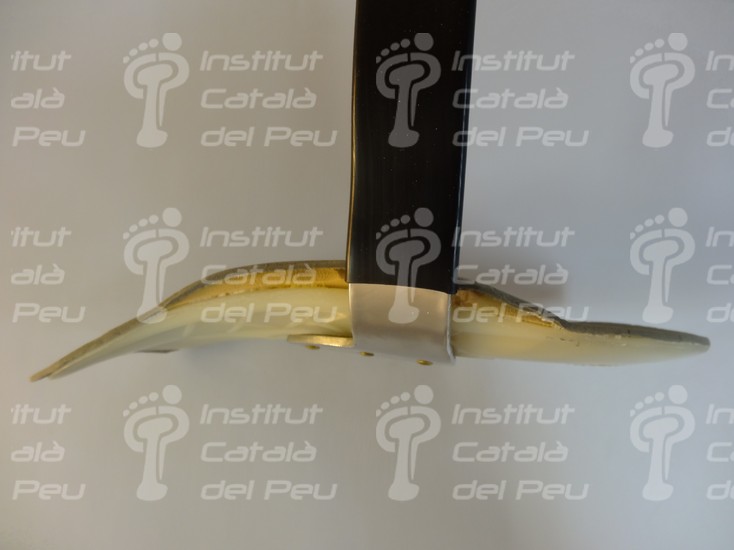We call a splint an external device or structure of different materials for therapeutic purposes that maintains its position or holds or immobilises parts of the body (mainly moving or parts). Thus, it modifies the functional or structural aspects of the neuromusculo-skeletal system.
The Jousto Peroneus splint is suitable for those patients who suffer from a peroneal paralysis or a weakening in dorsiflexion and who require little or no correction of the varus or valgus foot. Its structure is very simple and it is based on a plastic plantar support, a metal bar made up of several superimposed light laminae (strips) covered in plastic. The action of the superimposed bars allows a controlled flexion-extension of the foot, which helps to raise and hold the disabled foot making it possible to have a more normal pace.
This system of strips is designed in a way that works as a “floating articulation” to prevent any kind of deformation in the plantar zone of the ankle.
Its main advantage over other splints with an ankle joint is to achieve the same functionality but without taking up so much space in the shoe or boot. Jousto’s splint helps to regulate the biomechanics of the pace, providing greater patient assurance, a saving in energy and a reduction of the complexes of such patients about their social acceptance.
This kind of splint can be made by hand by professionals although the comercial existence of these splints providins top-quality results and excellent esthetics makes us resort to their handcrafted manufacture.
The advantage of the commercialised Jousto Peroneus splint is the possibility (in this case necessary) of replacing the plantar support with a more specific support for the patient. The disadvantage the commercial splint has is that the metal bar sometimes requires a slight modification because it rubs against the malleolus.
I have showcased an example of a patient to whom we applied this kind of splint for equinus foot as a result of a lumbar slipped disk surgery.
Jousto splint, internal view.
Jousto splint, external view.
Detail of the strips that make up the bar.
Image of a plantar footprint. Observe the asymmetry of the footprints.
Jousto splint at a provisional stage.
Jousto splint at a provisional stage.
Jousto splint at a provisional stage.
Jousto splint in at a provisional stage inside the shoe.
Finished Jousto splint.
Detail of the modification of the original plantar support.
Finished Jousto splint. Front view.
Finished Jousto splint. Side view.
Finished Jousto splint. Back view.
